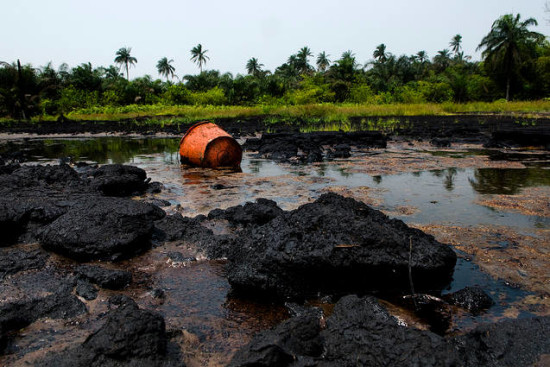The Federal Government has commenced move aimed at ensuring victims of oil spill and polluted environments across the country access the International Oil Pollution Compensation (IOPC) fund of the International Maritime Organisation (IMO).
The IOPC fund provides financial compensation for oil pollution damage that occurs in member states, resulting from spills of persistent oil from tankers.
The IOPC fund is financed by contributions paid by entities that receive certain types of oil by sea transport. Since its establishment, the fund has been involved in 150 incidents of varying sizes all over the world.
Speaking in Lagos at the opening of a three-day workshop jointly organised by the Nigerian Oil Spill Detention and Response Agency (NOSDRA) and the Nigerian Maritime Administration and Safety Agency (NIMASA) in partnership with the Global Initiative for West, Central and Southern Africa (GIWACAF), Minister of Environment, Dr. Mohammad Abubakar, stated that the objective of the workshop was to draw attention to the scope and implementation of the IOPC fund, focusing on the procedure related to liability and compensation in case of an oil spill.
The Minister, who was represented by the Director General of NOSDRA, Idris Musa, noted that apart from socio economic losses suffered by communities, consideration should also be given to ecological damage of the ecosystem.
He said, “The devastating impacts of oil spills on the environment, health and livelihoods of our rural and urban communities have led to land degradation, loss of lives, destruction of habitats, loss of bio-diversity, incidence of diseases, poor sanitation, loss of livelihoods as well as the depletion of national revenue base.
“The need to work out modalities on how to adequately and fairly compensate both victims of oil spill pollution and the environment is the reason we are here today. However, our peculiar circumstances in Nigeria demand for a Convention that will give attention to liability and compensation regime for oil spills which occur from Floating Production Storage and Offtake (FPSO), which are also loading points for maritime tankers.
“Consideration should not only be given to socio-economic losses suffered by individual or communities but also to ecological damage by way of effective restoration of the damaged ecosystem.”
Speaking earlier, Director General, NIMASA, Dakuku Peterside, explained that the workshop will provide training for relevant national authorities on the scope and implementation of IMO conventions relating to liability and compensation in an oil spill case study.
“The IMO in collaboration with NIMASA and NOSDRA is organising this workshop to provide training relating to cost evaluation and compensation procedure in the event of an oil spill.
“This will also provide essential knowledge and skill to develop strategy and policies for an effective shoreline response (clean-up assessment) within the respective countries of member states of GIWACAF,” Dakuku who was represented by the agency’s Executive Director, Maritime Labour and Cabotage Services, Ahmed Gambo said.

